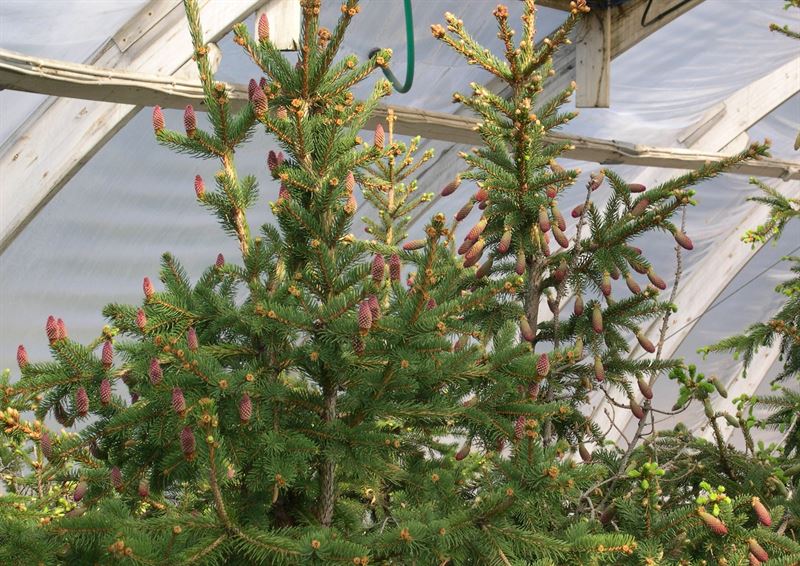Better spruce trees from greenhouse orchards

Sweden’s first large-scale greenhouse orchard for control-pollinated spruce seeds has opened at Södra’s nursery in Falkenberg. The project, conducted jointly with the Forestry Research Institute of Sweden, will improve the quality of future spruce trees.
The supply of control-pollinated spruce seedlings* cannot keep pace with forest owner demand. To meet this need, Södra and the Forestry Research Institute of Sweden have now launched a project to increase the production of control-pollinated spruce seeds.
“Such a high level of demand is a positive trend. Control-pollinated seeds will produce higher quality trees and improve tree growth. This will increase the returns that forest owners receive from harvesting, and improve the quality of the end-products,” said Johan Jonsson, Head of Södra Skogsplantor.
Södra is already conducting a similar project with a focus on control-pollinated birch seeds. We are now moving forward with control-pollinated spruce seeds. In the greenhouse orchard, the trees are periodically grown indoors to stimulate flowering, and to ensure they only cross-pollinate with each other. All of the desirable traits are thereby transferred from the selected spruce trees to the seeds, and then to the future trees.
Long-term project
The project to breed control-pollinated spruce seeds was launched in autumn 2018. In spring 2019, the first trees will be delivered to the facility and seed production will begin.
“This is a long-term project and will run for at least ten years. Forest biomass plays a key role in the replacement of fossil-fuel products and energy, and higher returns mean a lot for employment in rural areas and welfare. One of Södra’s sustainability targets is to offer its members products and services that will lead to a 20-percent higher rate of forest growth on their estates by 2050. Our control-pollinated seeds and seedlings, and the increase in growth they provide, are key to achieving this objective,” said Göran Örlander, forestry strategist at Södra.
“The project is based on integrating the breeding work carried out by the Forestry Research Institute of Sweden with Södra’s mass propagation. The trees grown in Falkenberg will provide the best cultivation material and the Forestry Research Institute of Sweden will conduct controlled pollination on the trees in Falkenberg for continued breeding,” said Curt Almqvist, Project Manager at the Forestry Research Institute of Sweden.
*Plant breeding is based on the knowledge that some traits are genetic. Control-pollinated seedlings are bred from the seeds harvested from a seed orchard. A seed orchard has fully grown father and mother trees that have been selected to transfer their superior genetics, such as health and soundness, better climate adaptation, wood quality and strong growth, to their progeny. In the spring, the parent trees cross-pollinate, and the cones containing the seeds are collected in the autumn.
For more information, please contact:
Johan Jonsson, Head of Södra Skogsplantor
Phone: +46 (0)470-893 63
E-mail: johan.jonsson@sodra.com
Södra’s Pressroom
Phone: +46 (0)470 890 90
E-mail: press@sodra.com
Södra was founded in 1938 and is the largest forest-owner association in Sweden, with a membership of more than 51,000 forest owners. We engage in modern and responsible forestry, and operate state-of-the-art mills in which we process our raw material. Net sales in 2017 were 20.5 SEK billion and there were 3,400 employees. Through value-generating relationships and a long-term approach, Södra is leading the way for the future of sustainable forestry.
Tags:


